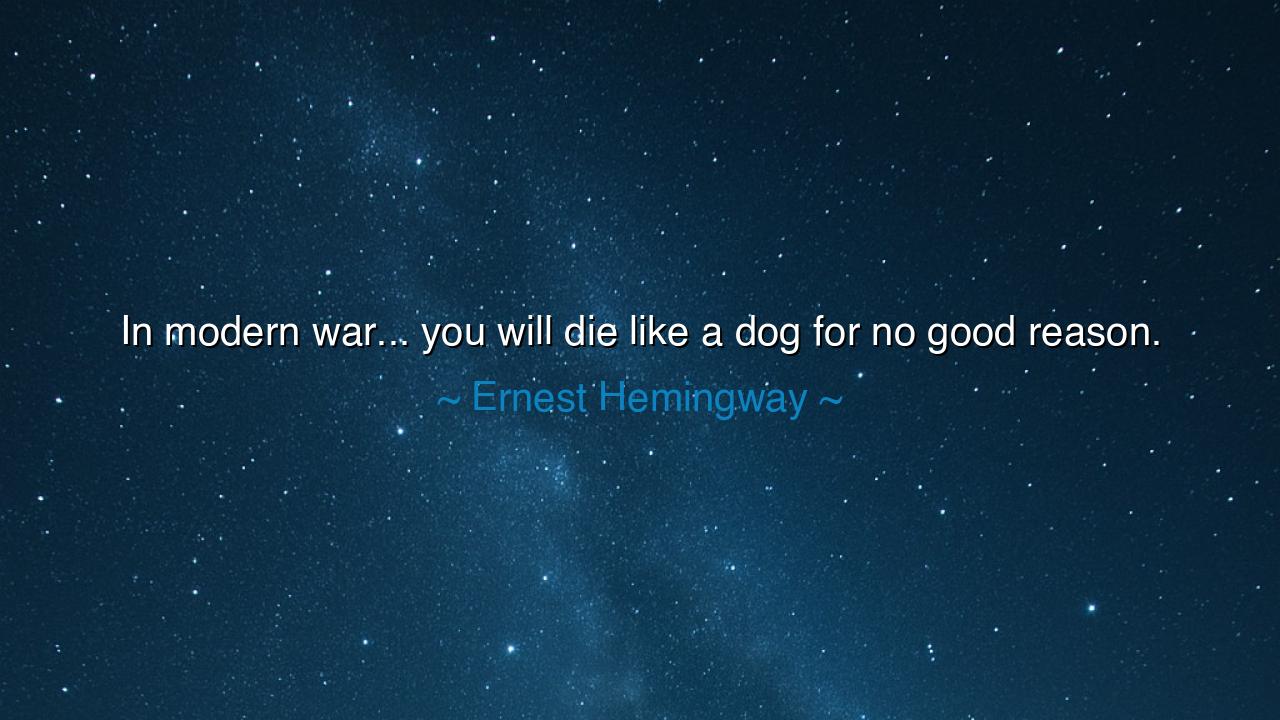
In modern war... you will die like a dog for no good reason.






Ernest Hemingway, who bore witness to the carnage of the twentieth century, declared with bitter honesty: “In modern war... you will die like a dog for no good reason.” These words are not clothed in glory, nor softened by illusion. They are harsh, unadorned, and raw, because Hemingway had seen war’s truth — that in the age of machines and mass destruction, the individual soldier is often swallowed by forces far beyond his control, his death unnoticed, his sacrifice rendered meaningless by the cruelty of circumstance.
To say that in modern war one dies "like a dog" is to strip away the myths of honor and valor that once surrounded battle. In ancient times, men imagined that to die in combat was noble, that their passing would be sung in poems and carved in stone. But with the rise of trench warfare, machine guns, bombs, and artillery, the battlefield became an anonymous slaughterhouse. Men fell not in duels of courage but in mud, torn apart by shells they never saw, gasping for breath in poison clouds, buried beneath earth churned by explosives. Hemingway’s own service in World War I left him seared with this image of impersonal death.
The phrase “for no good reason” strikes at the heart of his despair. In the old stories, warriors died for kingdoms, for gods, for honor. But in the wars Hemingway knew, soldiers perished for a few yards of dirt, for strategies soon abandoned, for political aims hidden from those who fought. The trenches of the Somme, the fields of Verdun, the forests of the Argonne — these became graves for millions, their deaths serving little more than the pride or folly of rulers. Hemingway’s words strip war bare, showing it not as noble sacrifice, but as futility.
Consider the Battle of the Somme in 1916. On the first day alone, nearly 60,000 British soldiers were killed or wounded, many cut down by machine guns before even crossing no man’s land. They died not in heroic charges but in waves of helpless slaughter. Entire regiments were annihilated, and the ground gained was measured in yards, soon lost again. Here is the truth Hemingway names: men died like dogs, not because of personal failure, but because modern war had turned them into expendable pieces in a vast, merciless machine.
Yet within his bitterness, there is also a warning. Hemingway forces us to confront the cost of war honestly, without the veil of glory. If death in modern war is futile, then the true task of civilization is to prevent such waste, to ensure that human life is never thrown into the furnace for hollow causes. His words do not dishonor the courage of soldiers; rather, they defend their dignity by exposing the cruelty of leaders who squander it. By refusing to romanticize, he honors the truth, and truth is the beginning of wisdom.
The lesson is clear: never be deceived by those who speak of war lightly, who clothe it in grandeur or necessity without showing its cost. Question the cause before you give your life to it. Ask whether the reason is truly just, whether the sacrifice will serve humanity or only ambition. And in your daily life, resist the temptation to glorify violence in any form. Stand instead for peace, for dialogue, for the patient labor of reconciliation, so that no one must die “like a dog” in vain.
Therefore, my children, carry Hemingway’s grim truth as both burden and guide. Remember the anonymous dead, who perished without song or statue, and let their memory strengthen your resolve to prevent such folly. Live so that your strength builds life, not destruction; so that your courage serves compassion, not cruelty. For if the past century has taught us anything, it is this: in modern war, the price is too great, and the reasons too small. Only wisdom, restraint, and peace can preserve the dignity of man.






NHHuy Nguyen huu
This quote is a harsh but sobering reflection on the nature of modern warfare. It suggests that many soldiers die without a clear or justifiable reason, and that the causes they fight for may be trivial compared to the cost. It makes me wonder—how can we change the way we view war and its consequences? Can we create a world where soldiers don’t have to face such senseless death, or is this part of the inevitable cycle of conflict?
XHCao Xuan Huy
Hemingway’s words strike at the heart of the human cost of war. To die ‘like a dog for no good reason’ challenges the glorification of battle. If soldiers are fighting without purpose, what does that say about the leadership and decisions that lead them into battle? Is it possible to break free from this endless cycle of meaningless conflict, or are we trapped in a system where the value of human life is overlooked?
GDGold D.dragon
This quote is haunting, yet it feels incredibly true. It makes me question why so many wars are fought in the modern world that seem to have no clear purpose or noble cause. Are we simply sending people to die without truly understanding or addressing the reasons behind the conflict? Can we, as a society, ever fully justify the loss of life in war, or are we doomed to repeat this cycle?
NDQuan Nguyen dinh
Hemingway’s quote paints a stark and painful picture of the futility of modern war. It speaks to the idea that soldiers often sacrifice their lives for causes they don’t fully understand or for reasons that seem senseless in hindsight. Is this the true cost of war—human lives lost for no meaningful gain? What does it say about how we glorify war and the horrors soldiers face in service of decisions made by others?